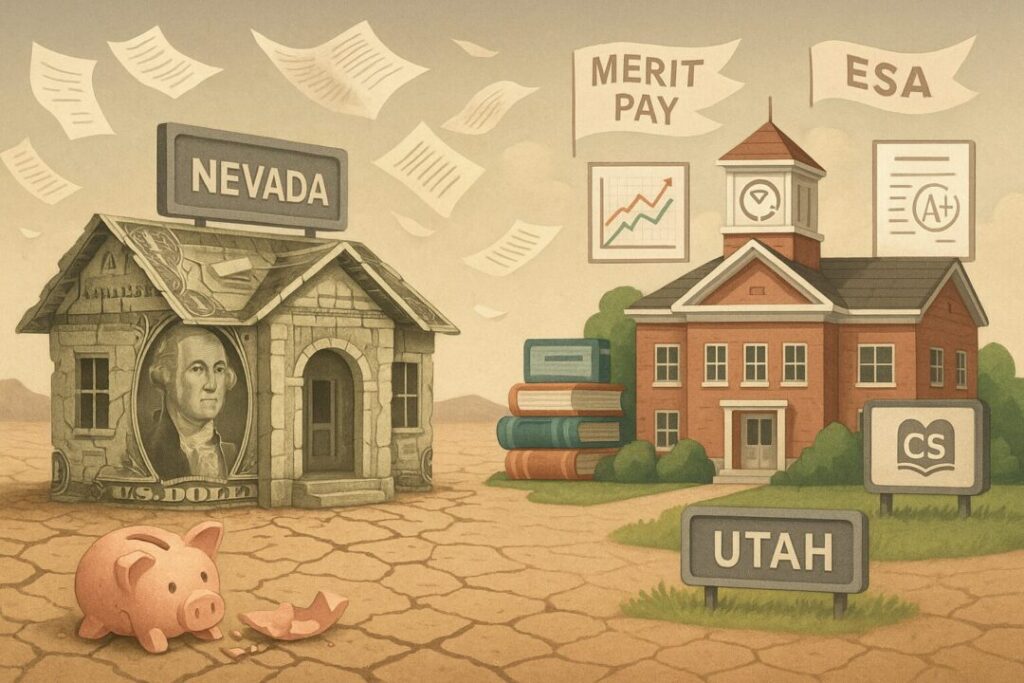(Anahit Baghshetsyan, Nevada Policy) – There is a persistent belief in the Silver State that outspending other states in education will miraculously improve the academic achievement of Nevada students. Currently, the state spends over $13,000 per public school pupil.
That’s a dramatic jump from previous years, but test scores remain flat (as they have since 1970s), and graduation standards continue to fall.
Instead of focusing on where the money can go to benefit student achievement and performance, the conversations in Carson City chambers throughout the legislative session often focused on elevating Nevada’s spending even higher – wrong approach, yet again.
What school districts need is smarter spending. More funds tend to generate more waste when districts aren’t held accountable to their customers—Nevada families—and forced to perform in order to earn their business.
Accountability Without Results
One of the core problems is that much of this money never reaches the classroom. Audits of the Clark County School District have revealed recurring problems with school employees purchasing of personal items with public funds, delays in fund deposits, and more.
The 2025 legislative session focused on accountability for public schools with new policies such as the creation of School District Oversight Board, allowing district takeovers of underperforming schools, and requiring submissions of certain strategic plans. But these policies seem to throw more bureaucratic complexities at the issue, without getting to the core of the spending and misuse of funds.
Parallel to legislators “prioritizing” accountability, measures that unevenly benefited teacher unions were also passed. SB 161 will now exempt teacher unions from the statewide ban on public-employee strikes, effectively granting them the right to strike and shut schools down.
School districts are already compelled by law to negotiate in good faith with unions toward a collective bargaining agreement and, in case of disagreement, an arbitrator is appointed to settle the difference. This process guarantees a union contract and teacher unions proposed this structure in exchange for agreeing not to strike.
Now, they’ve gone back on their own deal, leaving Nevada families exposed to possible sudden closures of their kids’ schools.
Utah’s Lesson: Smart Spending Beats Big Budgets
Meanwhile states like Utah continue to defy the myth that more money equals better educational outcomes. The Beehive State has consistently ranked near bottom of national average spending per pupil, yet Utah students outperform many of the states that outspend them, including Nevada.
In math, Utah excels, sharing the top spot with Massachusetts — which spends more than twice as much per student — for the highest percentage of eighth graders scoring above proficient in 2022. The state’s 4th graders also outperform their counterparts both in reading and math.
The lower number of at-risk student population often raises criticism of this argument; however, Utah performs respectably among the three peers – Minnesota, New Hampshire, and North Dakota – even though it is spending far less per student than any of them. In short, Utah is a living testament that great academic achievements do not require impoverishment of the taxpayers—the money just has to be spent well.
The Real Reforms Nevada Needs
If Nevada is serious about improving student outcomes, the Legislature must shift focus toward policies that incentivize academic excellence and empower families.
That means exploring merit-based pay for the best-performing teachers, expanding programs like Opportunity Scholarships and Educational Savings Accounts, reconsidering tenure protections that make it difficult to remove ineffective educators, and prioritizing transparency in how funds are used. All these measures were introduced yet never received a hearing in the 83rd legislative session, trapping the students at the epicenter of the Great Nevada Education Crisis.
Until the education marketplace becomes subject to real consumer discipline—by giving consumers a choice–bloated education budgets will just throw good money after bad.
This article was originally published by NevadaPolicy.org on 8/18/25. The opinions expressed by contributors are their own and do not necessarily represent the views of Nevada News & Views.



